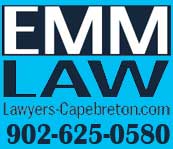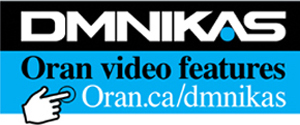-by Bonny H.J. MacIsaac
Back in the '90s, I lost a very dear friend to melanoma. I still think back to our last visit and how heart breaking it was. I made a promise to myself and his mother that I would write a column each year on this deadly form of skin cancer. The numbers are still alarmingly high despite all the information available to us.
The Save Your Skin Foundation is dedicated to informing and educating Canadians about melanoma, the deadliest form of skin cancer, that has been steadily on the rise since the 1990s in both men and women. The latest estimates show that this year alone, 8,000 Canadians will be diagnosed with melanoma and 1,300 will die from it. A recent survey shows there are serious knowledge and information gaps among Canadians about this cancer.
Hayley Wickenheiser, six-time Olympian and Hockey Hall of Famer, is supporting an educational campaign to bridge these gaps so that Canadians will better understand this potentially devastating skin cancer and those diagnosed will be adequately armed to make informed decisions.
Melanoma should be taken very seriously, and the risks associated with melanoma should be understood by all Canadians, especially those who spend long hours outdoors, such as athletes and outdoor workers. According to results from a new survey more than half of Canadians (55 per cent) do not realize a small amount of sun exposure without protection can lead to melanoma.
Hayley knows that it can be easy to lose sight of the importance of skin protection when you are so focussed on the game. “When I was training and playing sports, I spent hours in the sun and was vigilant about sun protection. Young athletes are healthy and fit and so focussed on the game or practice – the last thing that you want to think about is skin cancer, let alone melanoma. The important message we want to get across is that melanoma isn't simply about cutting something out and moving on; it is complicated and can be deadly. There's a certain level of danger that comes with fun in the sun, so the time you take to protect yourself is worth it. A cancer diagnosis could have a much worse outcome.”
The rise in melanoma rates shows that Canadians are seeking sun exposure without using the recommended precautionary measures. Severe burns or any darkening of the skin, including a tan, is indicative of UV damage.
“Newly-diagnosed melanoma patients come to me and don't know where to begin. Having been on this journey myself I know the critical first step is knowing your cancer and what you are dealing with,” says Kathleen Barnard, melanoma survivor and founder of Save Your Skin Foundation. “With melanoma there are different mutations types that exist and knowing your mutation can determine your treatment path. About half of people with melanoma skin cancers have the BRAF gene and the only way to have this knowledge is to be tested for it. It is important to have that conversation with your doctor early on.”
The survey results also showed:
– Only half of respondents (51 per cent) say they are knowledgeable about melanoma;
– One in four are unaware that spending more time in the sun increases their risk; and
– Two thirds of Canadians (66 per cent) say they would want to know their mutation type if diagnosed with melanoma.
The survey was conducted by Leger in March 2020 in collaboration with Novartis Pharmaceuticals Canada Inc. and Save Your Skin Foundation.
Thanks to the Save Your Skin Foundation (SYSF) for this eye-opening information. They are a patient-led, not-for-profit organization dedicated to the fight against non-melanoma skin cancers, melanoma, and ocular melanoma through education, advocacy, and awareness initiatives across Canada. SYSF is dedicated to providing a community of oncology patients and caregiver support throughout the entire continuum of care, from prevention and diagnosis to survivorship. Please visit their website at saveyourskin.ca for more information.
****
While we are on the topic: The Canadian Dermatology Association (CDA) strongly recommends that you make it a daily habit to check the UV index, available on various radio stations, The Weather Network, and the Environment Canada website, among other locations. The UV index actually tends to peak in May and June on bright days. When the temperature is relatively low, most people don’t think about the potential for sunburns, as they are not hot.
Other things you can do to protect yourself and your loved ones:
– Avoid the sun as much as possible between 11:00 a.m. and 3:00 p.m. when the sun's rays are intense. During summer months when the UV Index is 3 or higher;
– Use a beach umbrella to provide shade while at the beach or park.
– Wear close-fitting, wraparound sunglasses or eyeglasses with UV-protective lenses. Look for glasses labelled with the Canadian Dermatology Association logo that guarantees “UV400” or “100 per cent UV protection.”
– Remember a cool wind on the water can mask the intensity of the sun's rays while involved in water sports. Also, UV rays can penetrate water to a depth equal to that of a person swimming.
– If on medication, check with your doctor before going out in the sun. It could trigger reactions.
– Avoid UV tanning equipment and deliberately trying to get a suntan.
– Top it all off with a wide-brim hat to keep UV radiation off the scalp, face, ears, and neck.
– Melanoma is highly curable in the early stages. About 90 per cent of melanoma can be cured if caught early. Remember the ABCD’s of melanoma? Well it has expanded to include E when checking your skin for changes in moles or other coloured spots.”
The ABCDE’s of melanoma are:
– Asymmetry – one half of the mole is unlike the other half.
– Border - irregular, scalloped, or poorly circumscribed border.
– Colour - varied from one area to another, shades of tan and brown; black, sometimes white, red, or blue.
– Diameter - larger than six mm as a rule, that's about the diameter of a pencil eraser.
– Elevation - it's raised above the surface of the skin.
If you have any questions regarding melanoma or on any other form of cancer, the Canadian Cancer Society has a toll-free number you can call their information specialists. Call toll-free at 1-888-939-3333 Monday to Friday, 9:00 a.m. to 6:00 p.m., anywhere in Canada.
****
Free! Cineplex has made available this great offer! Just posted on June 5th on their Twitter feed @CineplexMovies: “In a time when many are turning to movies to become informed and empowered, we want to help. Our ‘Understanding Black Stories’ collection was curated to elevate Black filmmakers. These films are available to view at no cost on the Cineplex Store. I counted 44 that are being offered for free. The link is here and it's free to sign up... https://cinplx.co/2AEYlfk.




